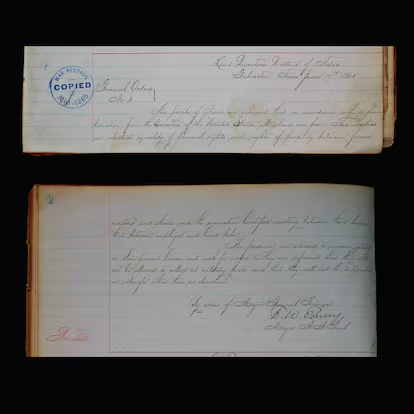Juneteenth: History, celebrations and more about the federal holiday
In 2021, then-president Joe Biden signed a bill that made Juneteenth an official federal holiday. This historic legislation marked a significant milestone in recognizing and commemorating the emancipation of enslaved African Americans

Juneteenth was first recognized as a federal holiday in 2021 when former president Joe Biden signed the Juneteenth National Independence Day Act into law. This historic event marked the first new federal holiday since the adoption of Martin Luther King Jr. Day in 1983. Juneteenth commemorates the emancipation of enslaved African Americans, specifically on June 19, 1865, when Major General Gordon Granger issued an order proclaiming freedom for slaves in Texas. Initially, Juneteenth was recognized only by certain communities, but it has since grown to become one of the most significant dates for Black Americans.
End of slavery
During the American Civil War, on September 22, 1862, President Abraham Lincoln issued the preliminary Emancipation Proclamation, a presidential proclamation and executive order that declared enslaved African Americans in Confederate states had to be freed. The final Proclamation was issued on January 1, 1863. It stated: “I do order and declare that all persons held as slaves within said designated States [in rebellion against the U.S.], and parts of States, are, and henceforward shall be free…” The proclamation affected South Carolina, Mississippi, Florida, Alabama, Georgia, Louisiana, Texas, Virginia, Arkansas, and North Carolina.
The Proclamation declared that the executive branch, including the Army and Navy, “will recognize and maintain the freedom of said persons.” It applied to more than 3.5 million enslaved people in the country. Approximately 25,000 to 75,000 individuals were immediately emancipated in regions of the Confederacy where the U.S. Army was present.
However, the enforcement of the Proclamation was not immediate everywhere. Texas, the most remote state of the former Confederacy, had 250,000 slaves. Many planters and slaveholders had migrated to Texas to avoid the war and had brought their slaves with them. News of the Proclamation reached Texas after its issuance, and while many slaves knew about Lincoln’s order emancipating them, they were not freed since the Union army had not yet reached Texas to enforce the Proclamation.
On April 9, 1865, Confederate General-in-Chief Robert E. Lee surrendered, followed by the surrender of the western Confederate Army of the Trans-Mississippi on June 2. On June 19, 1865, Union Major General Gordon Granger arrived at the island of Galveston to enforce the Emancipation Proclamation with General Order No. 3, which freed all remaining slaves. He also oversaw Reconstruction after the war, nullifying all laws passed within the state during the war by Confederate lawmakers.
While it is widely believed that Granger or his troops proclaimed the ordinance by reading it aloud, historians suggest that copies of the Ordinance were more likely posted in public places, including the church attended by Black Americans. The Order read: “The people of Texas are informed that, in accordance with a proclamation from the Executive of the United States, all slaves are free. This involves an absolute equality of personal rights and rights of property between former masters and slaves, and the connection heretofore existing between them becomes that between employer and hired labor. The freedmen are advised to remain quietly at their present homes and work for wages. They are informed that they will not be allowed to collect at military posts and that they will not be supported in idleness either there or elsewhere.”

The event has come to be celebrated as the end of slavery. However, emancipation for the remaining enslaved individuals in the Union border states of Delaware and Kentucky did not occur until December 18, 1865, with the ratification of the Thirteenth Amendment, which abolished slavery and involuntary servitude.
Juneteenth as a holiday
In Galveston, Texas, on June 19, 1866, one year after General Granger’s arrival, the first annual commemoration known as “Jubilee Day” was organized. Other observances took place on January 1 (the day the Emancipation Declaration was issued) or January 4. Some of these early celebrations served as political rallies to provide freed African Americans with instructions for voting.
In 1867, Black leaders in Austin, Texas, raised funds to purchase 10 acres of land, now known as Houston’s Emancipation Park, to celebrate the holiday. In subsequent years, the event drew thousands of attendees.
During the early 1890s, the Black community began using the word Juneteenth instead of Jubilee Day. The word derives its name from combining June and nineteenth. One of the earliest records of its use dates back to 1909 when The Current Issue, a Texas periodical, employed the term.

Although most early celebrations occurred in Texas, Black Americans who had left the state continued to commemorate Juneteenth wherever they relocated. By the second half of the 20th century, most states had established Juneteenth celebrations. Texas was the first state to declare Juneteenth a state holiday in 1980. By the end of the century, only three states officially observed the day. Over the next two decades, it gained recognition as an official observance in all states, except South Dakota, until it became a federal holiday under the Biden administration.
Texan Opal Lee and other Black Americans campaigned for decades to establish Juneteenth as a federal holiday. Each year, Lee led 2.5-mile walks, symbolizing the 2.5 years it took for news of the Emancipation Proclamation to reach Texas (although the news had arrived, slaves weren’t freed until the Union took control of the state). During the bill signing ceremony that designated Juneteenth as a federal holiday, she was an honored guest and President Joe Biden knelt down on one knee to greet her.
Thanks to the holiday, federal government employees now have the day off every year on June 19. If the date falls on a Saturday or Sunday, they have the closest Friday or Monday off, respectively.
Juneteenth celebrations in 2025
Americans across the country celebrate Juneteenth with festivals, parades, outdoor meals, and gatherings with friends or family. With each passing year, this relatively new holiday has gained greater recognition in various communities. However, some states, such as Florida, are attempting to prevent certain aspects of the history of the end of slavery from being taught in public schools.
This year, several cities have scaled back or canceled Juneteenth celebrations due to growing resistance to diversity, equity, and inclusion (DEI) initiatives promoted by the current administration. Budget cuts, safety concerns, and political backlash have affected festivities in places such as South Carolina, Illinois, Virginia, and Oregon.
Despite this, many localities are moving forward with their celebrations. One of the largest events is the parade and festival held in Milwaukee, where Juneteenth has been celebrated for more than 50 years. In contrast, San Marcos, California, will have its first celebration thanks to a local couple who have promoted the event.
Another parade will be held in the city of Austin, Texas, as will one in Pensacola, Florida, while cities across the country (such as New York, Los Angeles, and Chicago) will hold special events related to the culture and history of Black people in the United States.
Sign up for our weekly newsletter to get more English-language news coverage from EL PAÍS USA Edition
Tu suscripción se está usando en otro dispositivo
¿Quieres añadir otro usuario a tu suscripción?
Si continúas leyendo en este dispositivo, no se podrá leer en el otro.
FlechaTu suscripción se está usando en otro dispositivo y solo puedes acceder a EL PAÍS desde un dispositivo a la vez.
Si quieres compartir tu cuenta, cambia tu suscripción a la modalidad Premium, así podrás añadir otro usuario. Cada uno accederá con su propia cuenta de email, lo que os permitirá personalizar vuestra experiencia en EL PAÍS.
¿Tienes una suscripción de empresa? Accede aquí para contratar más cuentas.
En el caso de no saber quién está usando tu cuenta, te recomendamos cambiar tu contraseña aquí.
Si decides continuar compartiendo tu cuenta, este mensaje se mostrará en tu dispositivo y en el de la otra persona que está usando tu cuenta de forma indefinida, afectando a tu experiencia de lectura. Puedes consultar aquí los términos y condiciones de la suscripción digital.









































